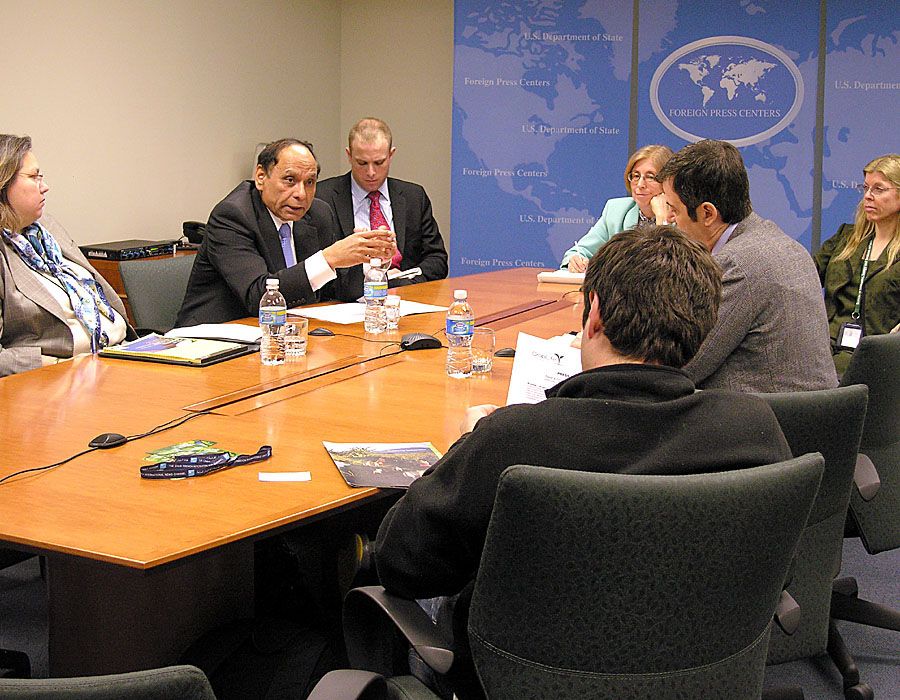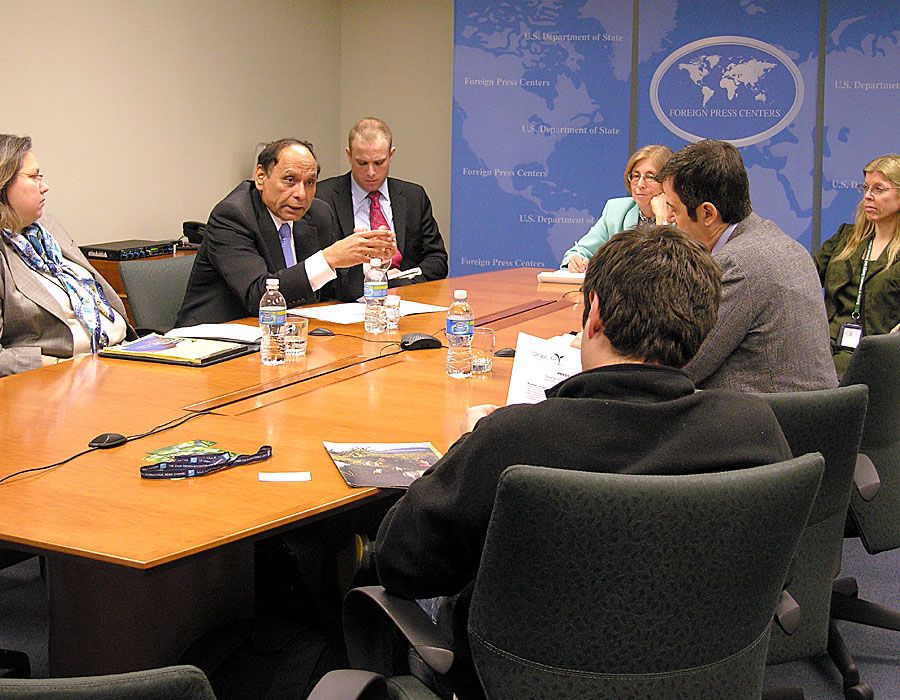 While in charge of governmental affairs at Croplife America, Isi Siddiqui, second from left, talks global patent law with U.S. Trade Office officials on April 22, 2009. But don’t use the “L” word! Photo: U.S. State Department
While in charge of governmental affairs at Croplife America, Isi Siddiqui, second from left, talks global patent law with U.S. Trade Office officials on April 22, 2009. But don’t use the “L” word! Photo: U.S. State Department
“[Croplife America] was relentless in its pursuit of monitoring and actively engaging with key influencers in its attempts to make certain that the Farm Bill was beneficial to members of [Croplife America] and ensuring it did not contain language detrimental or discriminatory to pesticides.”
— Jacob Secor, Director, Federal Government Affairs, Dow AgroSciences, quoted in Croplife America’s 2008 Annual Report (PDF)
—-
Last month, President Obama nominated Islam “Isi” Siddiqui, vice president for governmental affairs at pesticide industry trade group Croplife America, to the post of chief agricultural negotiator at the U.S. Trade Office.
If Siddiqui takes office, he will solidify his position as a textbook case of the “revolving door” between government and industry. Before going to work for the nation’s most prominent agrichemical trade group, he had spent a long career as an ag official, first for the state of California, later with the Clinton USDA, where he served as Under Secretary for Marketing and Regulatory Programs.
At the time of his nomination last month, I cynically assumed that Siddiqui would skate through Congress and take his post–and promptly begin battering down global trade barriers, making the world safe for U.S. agrichemicals and cheap ag commodities. “Once the Senate’s conservative stalwarts recover from the shock of supporting a man named Islam,” I wrote, “they’ll surely wave Siddiqui right through.”
Now I’m not so sure. Obama may have a confirmation crisis here–from his left. My colleague Tom Laskawy pointed out in conversation that Obama recently made a similarly dodgy pick: he tapped Joe Pizarchik, a Pennsylvania official with a track record of coddling coal interests, to head the Office of Surface Mining Reclamation and Enforcement. And that didn’t go as smoothly as planned.
As Kate Sheppard reported last week in Mother Jones:
When President Obama nominated Joseph Pizarchik to head the Office of Surface Mining Reclamation and Enforcement, critics blasted the choice, charging that Pizarchik has a history of favoring coal industry interests over the well-being of local residents. Still, it appeared Pizarchik would sail to confirmation this week–until an unknown senator placed a hold on his appointment. [Emphasis added.]
Kate reports that after Pizarchik’s confirmation had glided through the Senate Finance Commitee with just two “no” votes, a “mystery senator” placed a two-month block on a vote before the full Senate. Pizarchik now languishes in limbo–and Obama has time to think hard about replacing him with a regulator with a record of standing up to coal interests.
Now U.S. sustainable ag-related NGOs are trying to repeat that trick with regard to the Siddiqui nomination. In an op-ed published on Minute Man, Kathy Ozer, executive director of the National Family Farm Coalition and Marcia Ishii-Eiteman, senior scientist at the Pesticide Action Network North America, lambasted the pick.
They wrote: “It’s crucial that the Senate Finance Committee hears from public witnesses while investigating his past roles.” That’s code for: “We know he’ll sail though the committee; but won’t someone please have the guts to block this egregious pick?”
They have a strong case, I think. As they point out, Obama did vow to end the corrupt old practice of letting former lobbyists from a given industry make policy for that industry. Siddiqui evidently somehow meets the letter of that vow–he’s not currently a registered lobbyist (though he has been one in the past.) But let me repeat: he’s the executive in charge of “government affairs” for the nation’s main pesticide-industry trade group.
Read through Croplife’s 2008 and 2009 annual reports (PDFs), and you’ll note the group is very proud of the work Siddiqui has done in “governmental affairs”: everything from pushing to reduce “trade irritants” around pesticides under NAFTA to making sure “agricultural interests” are accounted for when assessing pesticide’s role in the collapse of honeybee populations.
The latter was a huge issue in 2008. Several European nations had banned certain insecticides on the suspicion that they were contributing to colony collapse disorder. Determined to stem a similar tide here, Siddiqui’s office shifted into high gear, actively framing honeybee collapse as a problem fixable by pesticides. According to the 2009 annual report:
In June of [2008], CropLife delivered written testimony to the House Agriculture Subcommittee on Horticulture and Organic Agriculture detailing… the many benefits to pollinator health attributable to the careful use of pesticides, i.e. miticides, used to protect bees from known natural threats.
Siddiqui and staff forgot to mention that widespread use of miticides in bee management had already given rise to pesticide-resistant supermites--which might themselves contribute to colony collapse.
Over on Politico, veteran food reporter Marian Burros published a good piece Monday detailing the backlash among sustainable-ag groups to to Siddiqui pick. Burros also dug up some good background. For example:
While Siddiqui was at CropLife, the company took part closed-door negotiations with the Environmental Protection Agency and the Office of Management and Budget to find ways to permit pesticide testing in children. The firm also was instrumental in securing an exemption for American farmers from the 2006 worldwide ban of the highly controversial chemical methyl bromide, a pesticide that depletes the ozone layer.
Burros also got an interesting statement from a White House official defending the pick. She quotes spokesman Benjamin LaBolt like this:
During his time at USDA, Dr. Siddiqui led the first phase of development for national organic natural food standards in the United States.
So despite his Croplife stint, Siddiqui is really a champion of sustainable ag, right? Well, it’s true that the USDA first rolled organic standards way back in 1998, when Siddiqui served as Under Secretary for Marketing and Regulatory Programs. But those with long memories will recall that the ageny’s initial stab at codifying organic standards was not one of its finest moments. As a refresher, here’s a vintage 1998 Mother Jones piece that details that unhappy episode. Here’s the money bit:
When the USDA finally released its national standards proposal last December, it not only included the use of genetically engineered products but also allowed for irradiation and fertilization with sewage sludge–which can contain metals and toxic chemicals.
The proposed standards also would prohibit organic certifiers from requiring higher standards than those of the USDA. “This means that if the government insists on allowing sewage sludge, irradiation, genetically engineered organisms, piperonyl butoxide, and other materials and technologies that the NOSB specifically rejected for use in organic production, then no one can certify that any product is free of these practices,” says organic farmer and NOSB [National Organic Standards Board] member Fred Kirschenmann. [Emphasis added.]
So even before going on the Croplife payroll, Siddiqui was evidently already pushing the interests of the agrichemical industry–and trying to decorate some of their wares with the organic label.
This is the guy we want leading agriculture negotiations on trade talks? Mystery senator who blocked the coal guy from overseeing coal clean-up, whomever you are: please work your magic once more.




